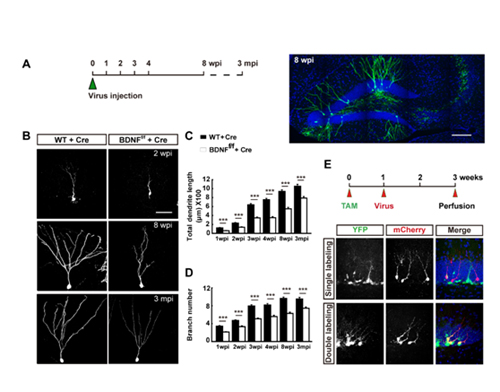Time:2015-06-13
In the hippocampus of adult mammalian brain, newborn granule cells (GCs) are continuously being generated in the subgranular zone (SGZ) of the dentate gyrus and incorporated into the existing neural circuits. These adult-born GCs contribute to cognitive functions and emotional regulation of the animal. The physiological functions of adult newborn neurons depend critically on the development of dendrite/axon morphology that is required for their proper integration into existing neural circuits. However, the cellular mechanisms regulating their dendrite development remains largely unclear.
In a recent study, graduate student WANG Liang under the supervision of Dr. POO Mu-ming, at the Institute of Neuroscience, Shanghai Institutes for Biological Sciences, CAS, examined the function of brain-derived neurotrophic factor (BDNF), which is expressed in adult-born GCs, in regulating their dendrite morphogenesis.Using retrovirus-mediated gene transfection, they found that deletion and overexpression of BDNF in adult-born GCs resulted in the reduction and elevation of dendrite growth, respectively. This effect was mainly due to the autocrine rather than paracrine action of BDNF, because deletion of BDNF only in the newborn GCs resulted in dendrite abnormality of these neurons to a similar extent as that observed in conditional knockout (cKO) mice with BDNF deleted in the entire forebrain. Furthermore, increased dendrite growth of adult-born GCs caused by voluntary exercise was abolished by BDNF deletion specifically in these neurons, and elevated dendrite growth due to BDNF overexpression in these neurons was prevented by reducing neuronal activity with co-expression of inward rectifier potassium channels, consistent with activity-dependent autocrine BDNF secretion. Thus, BDNF expressed in adult-born GCs plays a critical role in dendrite development by acting as an autocrine factor.
A paper describing this work, entitled "Autocrine action of BDNF on dendrite development of adult-born hippocampal neurons" was published online in the Journal of Neuroscience on June 3, 2015. This research was supported by grants from Ministry of Science and Technology and the Chinese Academy of Sciences.

Figure legend: (A) Schematic diagram showing the experimental procedure for labeling newborn granule cells (GCs) in adult mice through retrovirus-mediated gene transfection. (B-D) BDNF KO in single newborn GCs through retrovirus-mediated gene transfection resulted in defective dendrite development. (E) Tamoxifen induced BDNF KO in single newborn GCs had the same disruptive effect on dendrite development.
 附件下载:
附件下载: